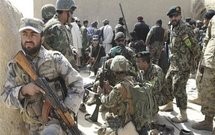 Heavy fighting was reported Wednesday between Afghan and Pakistani security forces along the northern end of the border between the two southwest Asian countries. The fighting reportedly took place in the Goshta district of Afghanistan’s eastern Nangarhar province. The two sides have been sparring for weeks over what Kabul says are Islamabad's efforts to establish security outposts on Afghan soil.
Heavy fighting was reported Wednesday between Afghan and Pakistani security forces along the northern end of the border between the two southwest Asian countries. The fighting reportedly took place in the Goshta district of Afghanistan’s eastern Nangarhar province. The two sides have been sparring for weeks over what Kabul says are Islamabad's efforts to establish security outposts on Afghan soil.
This is not the first time Afghan and Pakistani forces have clashed; they have fought limited battles over the years. Kabul's refusal to recognize the Durand Line, the de facto border between the two countries drawn by the British in the late 19th century, started the current conflict in the 1970s.
More than forty years later, the situation has become worse. The Islamist militancy that began in Afghanistan -- with Pakistan's support -- has spread across large swaths of Pakistan and is causing Islamabad and Kabul to clash. Initially, the border skirmishes stemmed from Kabul's concerns that Afghan Taliban insurgents with sanctuary in Pakistan were staging attacks against Afghan President Hamid Karzai's forces and their Western allies. In recent years, though, with the rise of Pakistan's own Taliban rebels, Islamabad has been concerned that many of the Pakistani Taliban forces have fled to eastern Afghanistan, where they stage attacks on the Pakistani side.
Each side accuses the other of turning a blind eye to their respective rebels and, worse, possibly aiding them, but the presence of NATO forces has limited the scale of fighting between Afghan and Pakistani forces. With Western forces scheduled soon to leave the region, these clashes are expected to intensify. Afghan forces are weaker than those of Pakistan, but it is this very weakness that has Pakistan worried about its own security in the post-NATO period.
Kabul is facing a critical transition -- at the same time as Western forces leave the country, a successor who has yet to be identified will replace Karzai. At that point, Pakistan will feel the need to take matters into its own hands and go after Taliban rebels on the Afghan side, which the Afghans will see as an attempt by the Pakistanis to support the Afghan Taliban.
We will therefore witness messy cross-border battles involving government and Taliban forces on both sides. It is not clear how the residual forces that the United States plans to leave behind will manage such a situation, but any action by American forces is sure to further stoke cross-border tensions.
One of the biggest questions surrounding post-NATO Afghanistan has been the state of security inside the country following the departure of Western forces in 2014, especially if no political settlement is reached beforehand. There is a consensus that the civil war within Afghanistan will intensify. Not enough attention is being paid, however, to a complex cross-border conflict that has the potential to destabilize not just Afghanistan, but Pakistan as well.
Courtesy : Stratfor (www.stratfor.com)